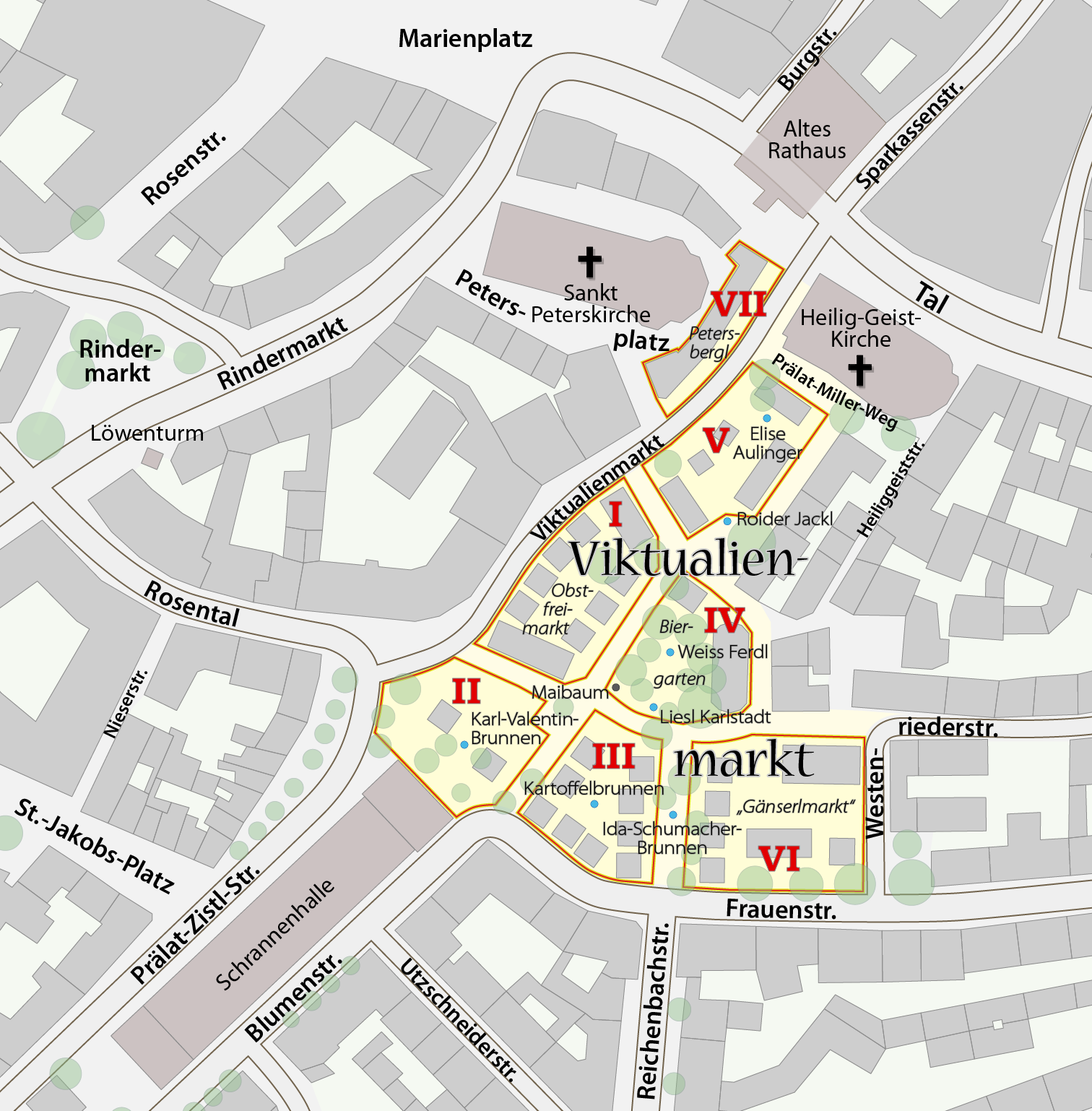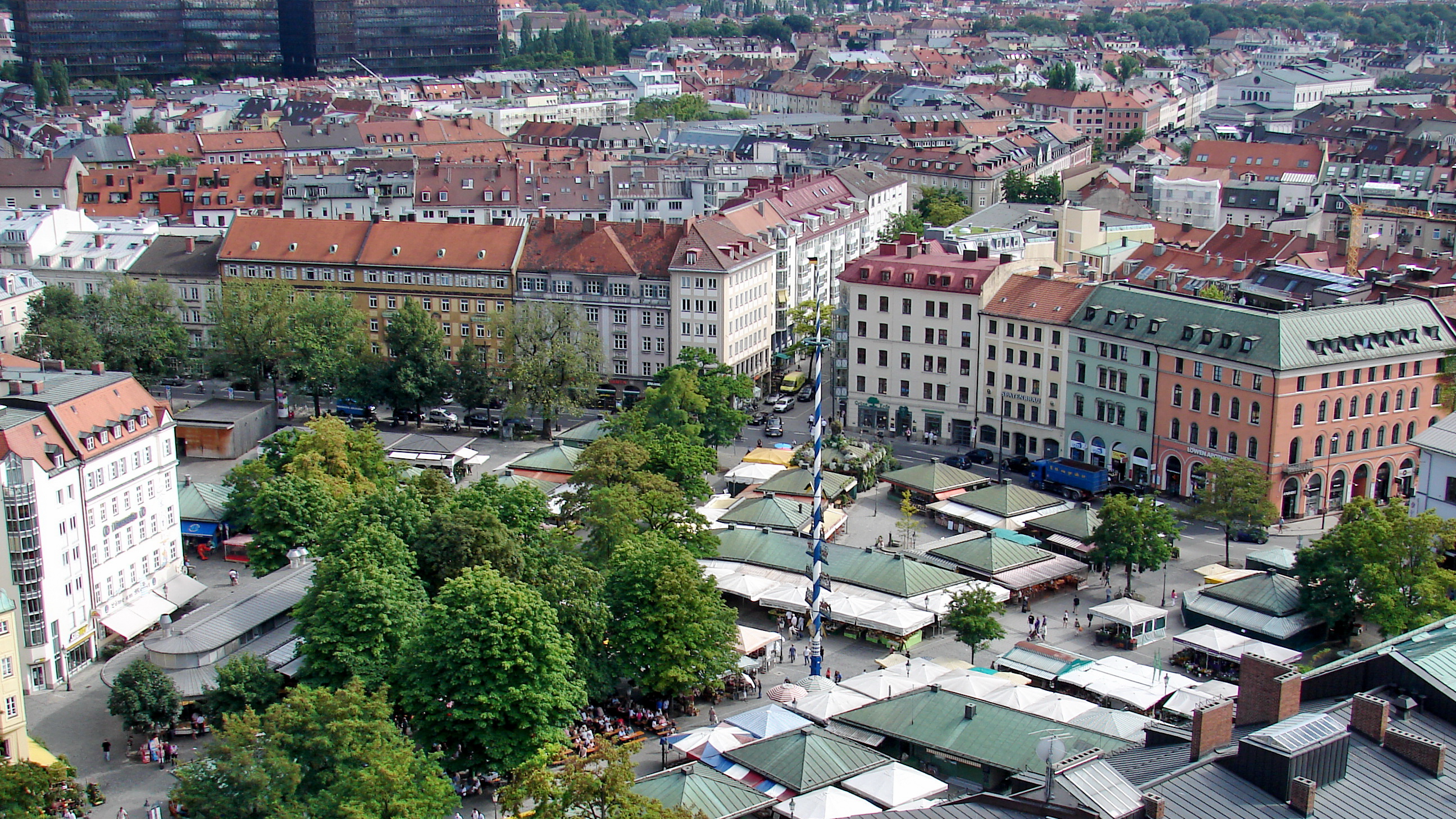Viktualienmarkt on:
[Wikipedia]
[Google]
[Amazon]






 The Viktualienmarkt is a daily food market and a square in the center of
The Viktualienmarkt is a daily food market and a square in the center of
Panorama View
{{Authority control Squares in Munich Retail markets in Munich Tourist attractions in Munich Culture in Munich




 The Viktualienmarkt is a daily food market and a square in the center of
The Viktualienmarkt is a daily food market and a square in the center of Munich
Munich ( ; german: München ; bar, Minga ) is the capital and most populous city of the German state of Bavaria. With a population of 1,558,395 inhabitants as of 31 July 2020, it is the third-largest city in Germany, after Berlin and Ha ...
, Germany
Germany,, officially the Federal Republic of Germany, is a country in Central Europe. It is the second most populous country in Europe after Russia, and the most populous member state of the European Union. Germany is situated betwe ...
. It has been held daily since 1807, except on Sundays and public holidays.
The Viktualienmarkt developed from an original farmers' market
A farmers' market (or farmers market according to the AP stylebook, also farmer's market in the Cambridge Dictionary) is a physical retail marketplace intended to sell foods directly by farmers to consumers. Farmers' markets may be indoors or o ...
to a popular market for gourmet
Gourmet (, ) is a cultural idea associated with the culinary arts of fine food and drink, or haute cuisine, which is characterized by refined, even elaborate preparations and presentations of aesthetically balanced meals of several contrasting, of ...
s. In an area covering 140 stalls and shops offer flowers, exotic fruit, game, poultry
Poultry () are domesticated birds kept by humans for their eggs, their meat or their feathers. These birds are most typically members of the superorder Galloanserae (fowl), especially the order Galliformes (which includes chickens, quails, ...
, spices, cheese, fish, juices and so on.
History
When today'sMarienplatz
Marienplatz ( English: Mary's Square, i.e. St. Mary, Our Lady's Square) is a central square in the city centre of Munich, Germany. It has been the city's main square since 1158.
History
During the Middle Ages, markets and tournaments were hel ...
(formerly Schrannenplatz) as a store for cereals and other agricultural products had become too small, Viktualienmarkt as its official successor evolved where it is still situated today due to a decree issued by King Maximilian I on 2 May, 1807. The King ordered that those parts of the market between Heiliggeist Church and Frauenstraße should be relocated and told municipal authorities to demolish the buildings of the Heiliggeist hospice which had been acquired by the city. Thus, the "green market" had its own place, which was also named "market place" for some time. It was only later that the word "Viktualien" (victual
Food is any substance consumed by an organism for nutritional support. Food is usually of plant, animal, or fungal origin, and contains essential nutrients, such as carbohydrates, fats, proteins, vitamins, or minerals. The substance is ing ...
s), Latin
Latin (, or , ) is a classical language belonging to the Italic branch of the Indo-European languages. Latin was originally a dialect spoken in the lower Tiber area (then known as Latium) around present-day Rome, but through the power of the ...
for food, was used.
From 1823 to 1829 the central market already had to be enlarged significantly. In 1885 the ancient Heiliggeist infirmary was demolished and the Heiliggeist Church was extended to the west.
In 1852, the precursor of today's Großmarkthalle, the Schrannenhalle, was built close to the ancient city wall at the end of Blumenstraße. It burned down in 1932 and was reopened in 2005.
In 1855 the fish market was moved to Westenriederstraße. Over the course of time many additions were made to the market, for example a butchers' hall, a tripe
Tripe is a type of edible lining from the stomachs of various farm animals. Most tripe is from cattle, pigs and sheep.
Types of tripe
Beef tripe
Beef tripe is made from the muscle wall (the interior mucosal lining is removed) of a cow's st ...
hall, pavilions for bakeries, fruit vendors and a fish hall. The butchers' shops at the foot of Petersbergl (Peter's hill, site of Peter's Church), the stalls for poultry and venison and the stands of the flower vendors expanded even further.
During World War II
World War II or the Second World War, often abbreviated as WWII or WW2, was a world war that lasted from 1939 to 1945. It involved the vast majority of the world's countries—including all of the great powers—forming two opposing ...
the square was severely damaged. There was talk of closing down the market in order to erect multi-story buildings. Instead, municipal authorities revitalized Viktualienmarkt with considerable financial support, and the citizens of Munich enriched it with memorial fountains for the folk singers and comedians Karl Valentin
Karl Valentin (born Valentin Ludwig Fey, 4 June 1882 in Munich – 9 February 1948 in Planegg) was a Bavarian comedian. He had significant influence on German Weimar culture. Valentin starred in many silent films in the 1920s, and was sometimes ...
, Weiß Ferdl
Weiss Ferdl (28 June 1883 – 19 June 1949, real name: ''Ferdinand Weisheitinger'') was a German actor, humorous folksinger, and author. He appeared in 19 films between 1928 and 1941 and performed regularly at the Platzl, a well-known Munic ...
and Liesl Karlstadt
Liesl Karlstadt (; born Elisabeth Wellano, 12 December 1892 – 27 June 1960) was a German actress and cabaret performer. Alongside Karl Valentin, she set the tone for a generation of popular culture in Munich. She appeared in more than 70 f ...
. Later, memorial fountains for the folk singers and comedians Ida Schumacher, Elise Aulinger
Elise Aulinger (11 December 1881 – 12 February 1965) was a German stage, radio and film actress.
Selected filmography
* ''The Favourite of the Queen'' (1922)
* ''Martin Luther'' (1923)
* ''What the Stones Tell'' (1925)
* '' The Seventh Son'' ( ...
and Roider Jackl
Roider Jackl (17 June 1906 in Weihmichl – 8 May 1975 in Freising; real name: ''Jakob Roider'') was a German performer, singer, and folk singer, who performed in Bavarian language.
He became famous in the 1950s especially because of the wri ...
were added.
In a 2009 New York Times
''The New York Times'' (''the Times'', ''NYT'', or the Gray Lady) is a daily newspaper based in New York City with a worldwide readership reported in 2020 to comprise a declining 840,000 paid print subscribers, and a growing 6 million paid ...
article about meals worth a plane trip across the Atlantic, food critic Mimi Sheraton
Mimi Sheraton (born Miriam Solomon; February 10, 1926) is an American food critic and writer.
Family and education
Sheraton's mother, Beatrice, was described as an excellent cook and her father, Joseph Solomon, as a commission merchant in a wh ...
picked a snack of sausages at the Viktualienmarkt.
Opening hours
In earlier times, the Viktualienmarkt was open every day (including Sunday) from 7 A.M. until dusk. Only on religious holidays, the market remained closed. Since the Viktualienmarkt was the central place for the food supply of the citizens of Munich, and there were no refrigeration facilities yet, the daily opening was crucial. Today, Viktualienmarkt is open until 8:00 P.M. at the latest, Monday through Saturday, as part of the statutory opening hours, with exceptions for florists, bakers and restaurants. Many market stalls do not exhaust the legally permitted opening hours, but each have their own reduced opening hours.Events
The market also hosts a number of traditional and folkloric events such as weighing celebrities, brewers' day, gardeners' day, opening of theasparagus
Asparagus, or garden asparagus, folk name sparrow grass, scientific name ''Asparagus officinalis'', is a perennial flowering plant species in the genus '' Asparagus''. Its young shoots are used as a spring vegetable.
It was once classified in ...
season, summer festival, dance of the market women on Shrove Tuesday
Shrove Tuesday is the day before Ash Wednesday (the first day of Lent), observed in many Christian countries through participating in confession and absolution, the ritual burning of the previous year's Holy Week palms, finalizing one's Lenten ...
, etc. Hence, the Viktualienmarkt, which has been a pedestrian zone since November 6, 1975 is also a meeting point.
Administration
The Viktualienmarkt is organized by the Wholesale Market Munich. The Wholesale Market Munich, together with Viktualienmarkt, Elisabethmarkt, Pasing Viktualienmarkt, Wiener Markt and the Weekly Markets in Munich, are operated by Munich Markets, amunicipal
A municipality is usually a single administrative division having corporate status and powers of self-government or jurisdiction as granted by national and regional laws to which it is subordinate.
The term ''municipality'' may also mean the go ...
company run by the City of Munich.
References
External links
* *Panorama View
{{Authority control Squares in Munich Retail markets in Munich Tourist attractions in Munich Culture in Munich